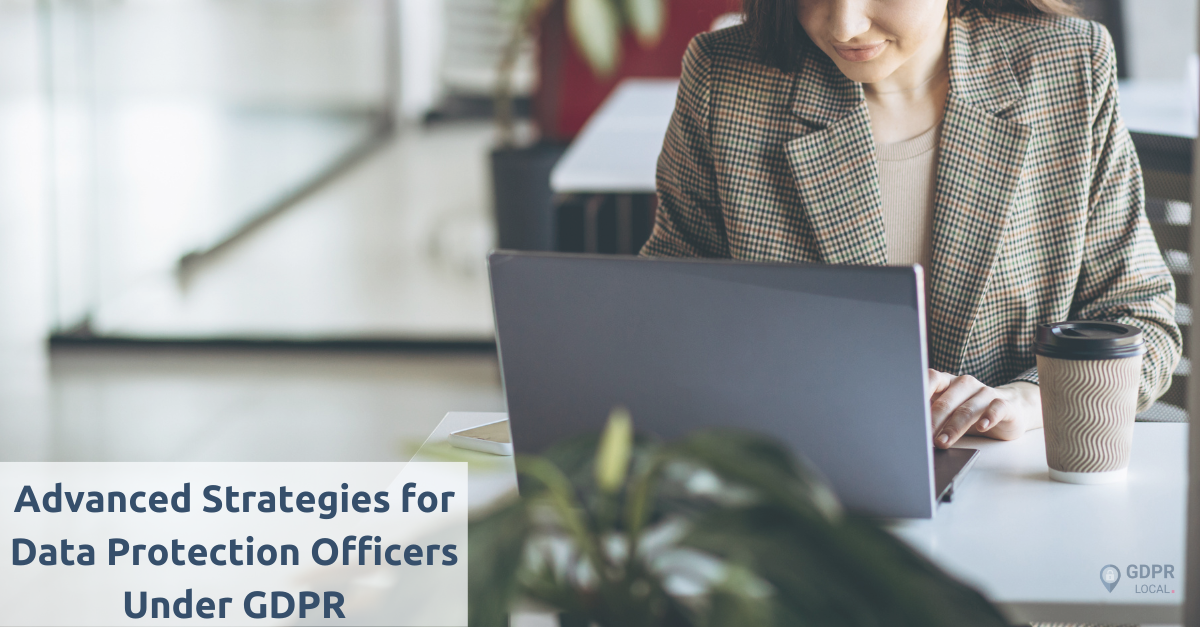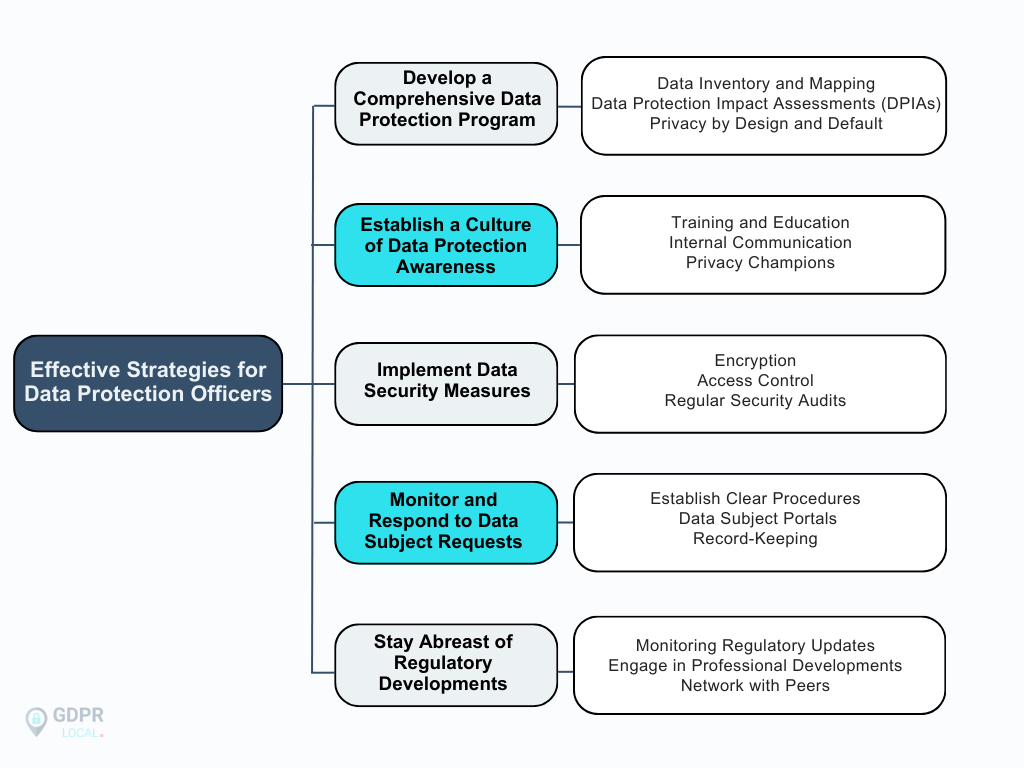
Advanced Strategies for Data Protection Officers Under GDPR
As a Data Protection Officer (DPO), you play a crucial role in ensuring your organization’s compliance with the General Data Protection Regulation (GDPR). The GDPR has transformed the landscape of data protection, introducing stringent requirements and hefty fines for non-compliance.
In this article, we will explore advanced strategies that can help you navigate the complex world of data protection under GDPR. We will discuss key responsibilities, challenges faced by DPOs, and effective approaches to enhance data protection.
Understanding the Role of a Data Protection Officer
As a DPO, your primary responsibility is to oversee your organization’s data protection strategy and implementation. According to GDPR Article 39, your key duties include:
Training organization employees on GDPR compliance requirements
It is essential to educate your colleagues about the importance of data protection and their roles in ensuring compliance.
Conducting regular assessments and audits to ensure GDPR compliance
Regular assessments help identify any gaps or vulnerabilities in your organization’s data protection measures, allowing you to take corrective actions.
Serving as the point of contact between the company and the relevant supervisory authority
You act as a liaison between your organization and the supervisory authority, facilitating communication and ensuring transparency.
Maintaining records of all data processing activities conducted by the company
Keeping detailed records of data processing activities helps demonstrate compliance and facilitates accountability.
Responding to data subjects to inform them about how their personal data is being used and what measures the company has put in place to protect their data
Promptly addressing data subjects’ inquiries and concerns is crucial for maintaining trust and transparency.
Ensuring that data subjects’ requests to see copies of their personal data or to have their personal data erased are fulfilled or responded to, as necessary
You must handle data subjects’ requests promptly and efficiently, adhering to the principles of data protection.
Challenges Faced by Data Protection Officers
Despite the importance of the DPO role, there are several challenges that you may encounter in your day-to-day responsibilities. These challenges include:
Obtaining Sufficient Resources
One of the main challenges faced by DPOs is securing adequate resources to fulfill their responsibilities effectively. This includes budgetary constraints, access to technology and tools, and support from management.
Navigating Organizational Structure
Organizations with complex structures may pose challenges for DPOs, as they need to navigate multiple departments and stakeholders to ensure compliance across the board.
Addressing Data Breaches
Despite robust data protection measures, data breaches can still occur. DPOs must be prepared to respond swiftly and effectively to minimize the impact of data breaches and ensure compliance with breach notification requirements.
Keeping Pace with Evolving Regulations
Data protection regulations continue to evolve, requiring DPOs to stay updated with the latest legal developments and adapt their strategies accordingly.
Effective Strategies for Data Protection Officers
To overcome these challenges and enhance data protection under GDPR, DPOs can implement several advanced strategies:

Develop a Comprehensive Data Protection Program
A comprehensive data protection program is essential for ensuring compliance and mitigating risks. Conducting a comprehensive assessment of data processing activities, delineating the types of data collected, purposes of processing, and involved parties are crucial. For high-risk processing, Data Protection Impact Assessments (DPIAs) should be performed to identify potential risks and institute suitable safeguards. Emphasizing the integration of privacy considerations into the design and implementation of systems, processes, and products, ensuring that data protection is embedded from the outset to foster a privacy-centric approach across operations.
Establish a Culture of Data Protection Awareness
Building a culture of data protection awareness is crucial for ensuring compliance throughout the organization. Regular training sessions should be provided to employees, highlighting data protection best practices and emphasizing their role in compliance. Internal communication channels are actively nurtured to create an environment where employees feel encouraged to report potential data protection issues and seek guidance. The organization should identify and empower privacy champions within various departments.
Implement Data Security Measures
Data security is a critical aspect of data protection. Implementing robust security measures helps safeguard personal data from unauthorized access or breaches. Some key strategies include: encrypting sensitive data both at rest and in transit to protect it from unauthorized access, implementing strong access controls, limiting access to personal data only to authorized individuals and conducting regular security audits to identify vulnerabilities and take necessary measures to address them.
Monitor and Respond to Data Subject Requests
Addressing data subject requests is a crucial aspect of GDPR compliance. You business should: develop clear procedures for handling data subject requests, ensuring that requests are acknowledged and responded to within the required timeframes. Consider implementing data subject portals or self-service options that allow individuals to exercise their rights easily. Additionally, maintain detailed records of data subject requests and responses to demonstrate compliance with data subject rights.
Stay Abreast of Regulatory Developments
Data protection regulations are continuously evolving. Stay updated with the latest legal developments and adapt your strategies accordingly. Regularly monitor updates from supervisory authorities and industry bodies to stay informed about changes in data protection requirements. Attend conferences, webinars, and training programs to enhance your knowledge and stay updated with the latest best practices. Engage with other DPOs and privacy professionals to exchange insights, share experiences, and learn from each other’s challenges and successes.
How GDPRLocal Can Help
At GDPRLocal, we specialize in providing advanced strategies and comprehensive support to DPOs. Our team of experienced professionals understands the intricacies of GDPR compliance and can guide you through the complex landscape of data protection. Our services include:
Compliance Assessments
We conduct thorough assessments of your organization’s data protection practices, identify gaps or vulnerabilities, and provide actionable recommendations for compliance.
Data Protection Training
Our training programs equip your employees with the knowledge and skills necessary to ensure compliance with GDPR requirements.
Technical Support
We offer technical expertise and support, helping you implement robust data security measures, conduct security audits, and respond to data subject requests.
Regulatory Updates
We keep you informed about the latest regulatory developments, ensuring that your organization stays ahead of the curve and adapts its data protection strategies accordingly.
Consultation and Advice
Our team of experts is available to provide guidance, answer your questions, and address any challenges you may face as a data protection officer.
Conclusion
As a Data Protection Officer, implementing advanced strategies is essential for ensuring your organization’s compliance with GDPR. By developing a comprehensive data protection program, establishing a culture of data protection awareness, implementing robust security measures, and staying updated with regulatory developments, you can effectively enhance data protection.
Contact us today at [email protected] to learn more about how we can help you navigate data protection under GDPR.